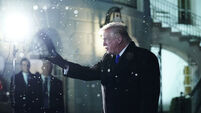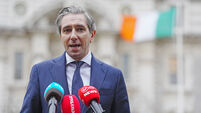Trade war averted as Government cautiously welcomes EU-US deal

European Commission president Ursula von der Leyen shaking hands with US president Donald Trump during their meeting at Trump Turnberry golf club in Scotland on Sunday. Picture: Andrew Harnik/Getty
A full-blown and hugely damaging trade war between the EU and US was averted late on Sunday after the two sides struck a deal, ending months of negotiations
A 15% baseline tariff will now apply to all EU exports to the US, with the union agreeing to buy up $750bn worth of US energy and to invest $600bn into the US economy in the years ahead.













